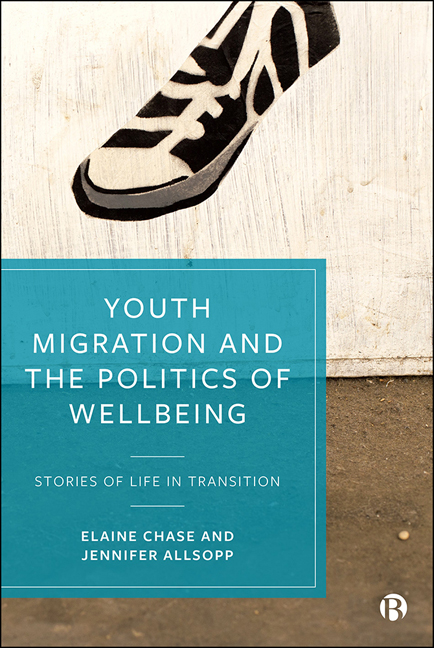Book contents
- Frontmatter
- Contents
- List of Figures
- Acknowledgements
- Foreword
- ‘Future’
- 1 Introduction
- 2 Conceptualizing Wellbeing in the Context of Migration and Youth Transitions
- 3 Capturing Wellbeing in Transition: An Alternative Approach
- 4 ‘Iron Rod’ or ‘Colander’? Welfare Regimes in England and Italy
- 5 The Pursuit of Safety and Freedom
- 6 Legal Integrity and Recognition
- 7 Identity and Belonging
- 8 Constructing Viable Futures as ‘Adults’
- 9 Emotional and Mental Wellbeing
- 10 Friendships, Connections and Relationships
- 11 Transnational Family and Connections
- 12 Conclusion
- Endnotes
- References
- Index
10 - Friendships, Connections and Relationships
Published online by Cambridge University Press: 21 April 2021
- Frontmatter
- Contents
- List of Figures
- Acknowledgements
- Foreword
- ‘Future’
- 1 Introduction
- 2 Conceptualizing Wellbeing in the Context of Migration and Youth Transitions
- 3 Capturing Wellbeing in Transition: An Alternative Approach
- 4 ‘Iron Rod’ or ‘Colander’? Welfare Regimes in England and Italy
- 5 The Pursuit of Safety and Freedom
- 6 Legal Integrity and Recognition
- 7 Identity and Belonging
- 8 Constructing Viable Futures as ‘Adults’
- 9 Emotional and Mental Wellbeing
- 10 Friendships, Connections and Relationships
- 11 Transnational Family and Connections
- 12 Conclusion
- Endnotes
- References
- Index
Summary
There wasn't much sleep in the boys’ room at the transit shelter in Italy that night. They sat atop their bunks chatting excitedly about who would stay and who would leave the next day. The shelter, it transpired, was primarily a space for rest, recovery and for building new networks and sharing information. Why, we asked several individuals among the hundreds who would sleep there each night, didn't they go and stay at the non-governmental organization (NGO) dorm a little way away, where there were more comfortable beds? ‘Because they don't have the type of information we need,’ explained Em, aged 15 from Eritrea. ‘They will tell us to stay here, and also … well, it's not fun!’ The shelter was full of bed bugs and was a catastrophe measured by any formal hygiene standards, especially when contrasted with the orderly rows of the NGO tent facilities. But Em was also right: the camp was often fun. That morning it had been visited by an itinerant German clown troupe and, as we talked, music was blaring from a car outside while kids danced and chalked pictures in the street. The social and relational aspects of migration are often given scant attention in political and policy spheres, but they emerged as a crucial aspect of wellbeing and an important determinant in the choices made by young people in our research.
For those waiting to move on from Italy to other places in Europe, getting a ticket to travel to the next destination (if, that is, they had one in mind) was contingent on access to a range of social and financial networks. Friends, family or contacts had to be approached at the destination and tickets had to be purchased, often with the assistance of agents. Many of those who spent extended periods at the transit shelter were waiting for money wired from ‘back home’ or were doing odd jobs in the irregular economy to save up enough to afford the next step of their journey.
While the Eritreans we met were relatively well networked and organized, minority nationalities who arrived at the camp usually had less access to information.
- Type
- Chapter
- Information
- Youth Migration and the Politics of WellbeingStories of Life in Transition, pp. 173 - 190Publisher: Bristol University PressPrint publication year: 2020



